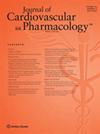过氧化物酶体增殖激活受体γ调节白细胞介素-6 诱导的人 HepG2 细胞中脂蛋白(a)基因表达。
IF 2.6
4区 医学
Q2 CARDIAC & CARDIOVASCULAR SYSTEMS
引用次数: 0
摘要
脂蛋白(a)[Lp(a)]是冠心病的一个危险因素。虽然脂蛋白(a)水平主要由基因决定,但来自炎症性疾病患者的数据表明,炎症环境与脂蛋白(a)水平升高有关。脂蛋白(a)在肝脏中合成,LPA 基因启动子包含一个白细胞介素-6(IL-6)反应结合位点,但炎症与肝脏脂蛋白(a)合成之间的调控步骤尚未明确。我们探索了 IL-6、过氧化物酶体增殖激活受体γ(PPARγ)和肝脏脂蛋白(a)合成在 HepG2 细胞中的相互作用。通过基因图谱绘制,确定了 LPA 启动子中与 PPARγ 结合位点重叠的调控变体。在体外实验中,PPARγ 基因敲除会增强 IL-6 介导的 LPA 基因转录,而 PPARγ 激动剂吡格列酮会抑制 LPA 基因转录。这些结果表明 PPARγ 在 IL-6 诱导的肝脏脂蛋白(a)生成中起着重要的负调控作用,可能成为以脂蛋白(a)升高为特征的炎症患者的一个新的治疗靶点。本文章由计算机程序翻译,如有差异,请以英文原文为准。
Peroxisome Proliferator-Activated Receptor Gamma Regulates Interleukin-6-Induced Lipoprotein (a) Gene Expression in Human HepG2 Cells.
Lipoprotein(a) [Lp(a)] is a risk factor for coronary disease. Although levels are primarily genetically determined, data from patients with inflammatory diseases indicate that the inflammatory milieu is associated with increased Lp(a) levels. Lp(a) is synthesized in the liver and the LPA gene promoter contains an interleukin-6 (IL-6) responsive binding site, but the regulatory steps linking inflammation with hepatic Lp(a) synthesis are not well clarified. We explored the interplay between IL-6, peroxisome proliferator-activated receptor gamma (PPARγ), and Lp(a) synthesis in HepG2 cells. Through genetic mapping, a regulatory variant within the LPA promoter overlapping with a PPARγ binding site was identified. In in vitro experiments, IL-6-mediated LPA gene transcription was heightened with PPARγ knock-down and suppressed with pioglitazone, a PPARγ agonist. These results demonstrate an important role of PPARγ as a negative regulator of IL-6 induced hepatic Lp(a) production and may represent a new therapeutic target for patients with inflammatory conditions characterized by elevated Lp(a).
求助全文
通过发布文献求助,成功后即可免费获取论文全文。
去求助
来源期刊
CiteScore
5.10
自引率
3.30%
发文量
367
审稿时长
1 months
期刊介绍:
Journal of Cardiovascular Pharmacology is a peer reviewed, multidisciplinary journal that publishes original articles and pertinent review articles on basic and clinical aspects of cardiovascular pharmacology. The Journal encourages submission in all aspects of cardiovascular pharmacology/medicine including, but not limited to: stroke, kidney disease, lipid disorders, diabetes, systemic and pulmonary hypertension, cancer angiogenesis, neural and hormonal control of the circulation, sepsis, neurodegenerative diseases with a vascular component, cardiac and vascular remodeling, heart failure, angina, anticoagulants/antiplatelet agents, drugs/agents that affect vascular smooth muscle, and arrhythmias.
Appropriate subjects include new drug development and evaluation, physiological and pharmacological bases of drug action, metabolism, drug interactions and side effects, application of drugs to gain novel insights into physiology or pathological conditions, clinical results with new and established agents, and novel methods. The focus is on pharmacology in its broadest applications, incorporating not only traditional approaches, but new approaches to the development of pharmacological agents and the prevention and treatment of cardiovascular diseases. Please note that JCVP does not publish work based on biological extracts of mixed and uncertain chemical composition or unknown concentration.

 求助内容:
求助内容: 应助结果提醒方式:
应助结果提醒方式:


